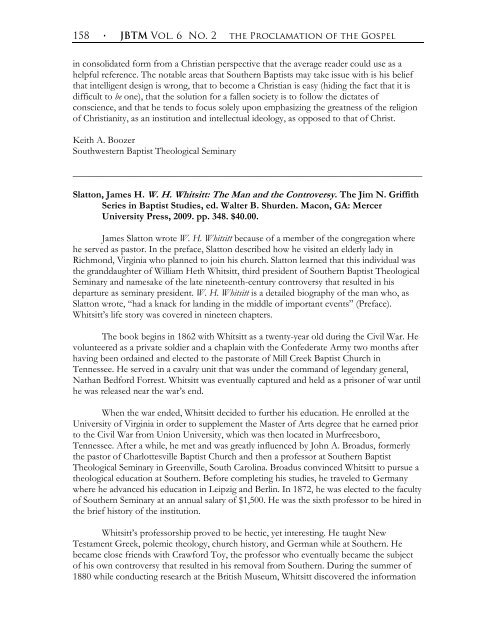0 jbtm vol. 6, no. 2 the proclamation of the gospel - Baptist Center for ...
0 jbtm vol. 6, no. 2 the proclamation of the gospel - Baptist Center for ...
0 jbtm vol. 6, no. 2 the proclamation of the gospel - Baptist Center for ...
You also want an ePaper? Increase the reach of your titles
YUMPU automatically turns print PDFs into web optimized ePapers that Google loves.
158 ٠ JBTM Vol. 6 No. 2 <strong>the</strong> Proclamation <strong>of</strong> <strong>the</strong> Gospel<br />
in consolidated <strong>for</strong>m from a Christian perspective that <strong>the</strong> average reader could use as a<br />
helpful reference. The <strong>no</strong>table areas that Sou<strong>the</strong>rn <strong>Baptist</strong>s may take issue with is his belief<br />
that intelligent design is wrong, that to become a Christian is easy (hiding <strong>the</strong> fact that it is<br />
difficult to be one), that <strong>the</strong> solution <strong>for</strong> a fallen society is to follow <strong>the</strong> dictates <strong>of</strong><br />
conscience, and that he tends to focus solely upon emphasizing <strong>the</strong> greatness <strong>of</strong> <strong>the</strong> religion<br />
<strong>of</strong> Christianity, as an institution and intellectual ideology, as opposed to that <strong>of</strong> Christ.<br />
Keith A. Boozer<br />
Southwestern <strong>Baptist</strong> Theological Seminary<br />
________________________________________________________________________<br />
Slatton, James H. W. H. Whitsitt: The Man and <strong>the</strong> Controversy. The Jim N. Griffith<br />
Series in <strong>Baptist</strong> Studies, ed. Walter B. Shurden. Macon, GA: Mercer<br />
University Press, 2009. pp. 348. $40.00.<br />
James Slatton wrote W. H. Whitsitt because <strong>of</strong> a member <strong>of</strong> <strong>the</strong> congregation where<br />
he served as pastor. In <strong>the</strong> preface, Slatton described how he visited an elderly lady in<br />
Richmond, Virginia who planned to join his church. Slatton learned that this individual was<br />
<strong>the</strong> granddaughter <strong>of</strong> William Heth Whitsitt, third president <strong>of</strong> Sou<strong>the</strong>rn <strong>Baptist</strong> Theological<br />
Seminary and namesake <strong>of</strong> <strong>the</strong> late nineteenth-century controversy that resulted in his<br />
departure as seminary president. W. H. Whitsitt is a detailed biography <strong>of</strong> <strong>the</strong> man who, as<br />
Slatton wrote, “had a knack <strong>for</strong> landing in <strong>the</strong> middle <strong>of</strong> important events” (Preface).<br />
Whitsitt’s life story was covered in nineteen chapters.<br />
The book begins in 1862 with Whitsitt as a twenty-year old during <strong>the</strong> Civil War. He<br />
<strong>vol</strong>unteered as a private soldier and a chaplain with <strong>the</strong> Confederate Army two months after<br />
having been ordained and elected to <strong>the</strong> pastorate <strong>of</strong> Mill Creek <strong>Baptist</strong> Church in<br />
Tennessee. He served in a cavalry unit that was under <strong>the</strong> command <strong>of</strong> legendary general,<br />
Nathan Bed<strong>for</strong>d Forrest. Whitsitt was eventually captured and held as a prisoner <strong>of</strong> war until<br />
he was released near <strong>the</strong> war’s end.<br />
When <strong>the</strong> war ended, Whitsitt decided to fur<strong>the</strong>r his education. He enrolled at <strong>the</strong><br />
University <strong>of</strong> Virginia in order to supplement <strong>the</strong> Master <strong>of</strong> Arts degree that he earned prior<br />
to <strong>the</strong> Civil War from Union University, which was <strong>the</strong>n located in Murfreesboro,<br />
Tennessee. After a while, he met and was greatly influenced by John A. Broadus, <strong>for</strong>merly<br />
<strong>the</strong> pastor <strong>of</strong> Charlottesville <strong>Baptist</strong> Church and <strong>the</strong>n a pr<strong>of</strong>essor at Sou<strong>the</strong>rn <strong>Baptist</strong><br />
Theological Seminary in Greenville, South Carolina. Broadus convinced Whitsitt to pursue a<br />
<strong>the</strong>ological education at Sou<strong>the</strong>rn. Be<strong>for</strong>e completing his studies, he traveled to Germany<br />
where he advanced his education in Leipzig and Berlin. In 1872, he was elected to <strong>the</strong> faculty<br />
<strong>of</strong> Sou<strong>the</strong>rn Seminary at an annual salary <strong>of</strong> $1,500. He was <strong>the</strong> sixth pr<strong>of</strong>essor to be hired in<br />
<strong>the</strong> brief history <strong>of</strong> <strong>the</strong> institution.<br />
Whitsitt’s pr<strong>of</strong>essorship proved to be hectic, yet interesting. He taught New<br />
Testament Greek, polemic <strong>the</strong>ology, church history, and German while at Sou<strong>the</strong>rn. He<br />
became close friends with Craw<strong>for</strong>d Toy, <strong>the</strong> pr<strong>of</strong>essor who eventually became <strong>the</strong> subject<br />
<strong>of</strong> his own controversy that resulted in his removal from Sou<strong>the</strong>rn. During <strong>the</strong> summer <strong>of</strong><br />
1880 while conducting research at <strong>the</strong> British Museum, Whitsitt discovered <strong>the</strong> in<strong>for</strong>mation


